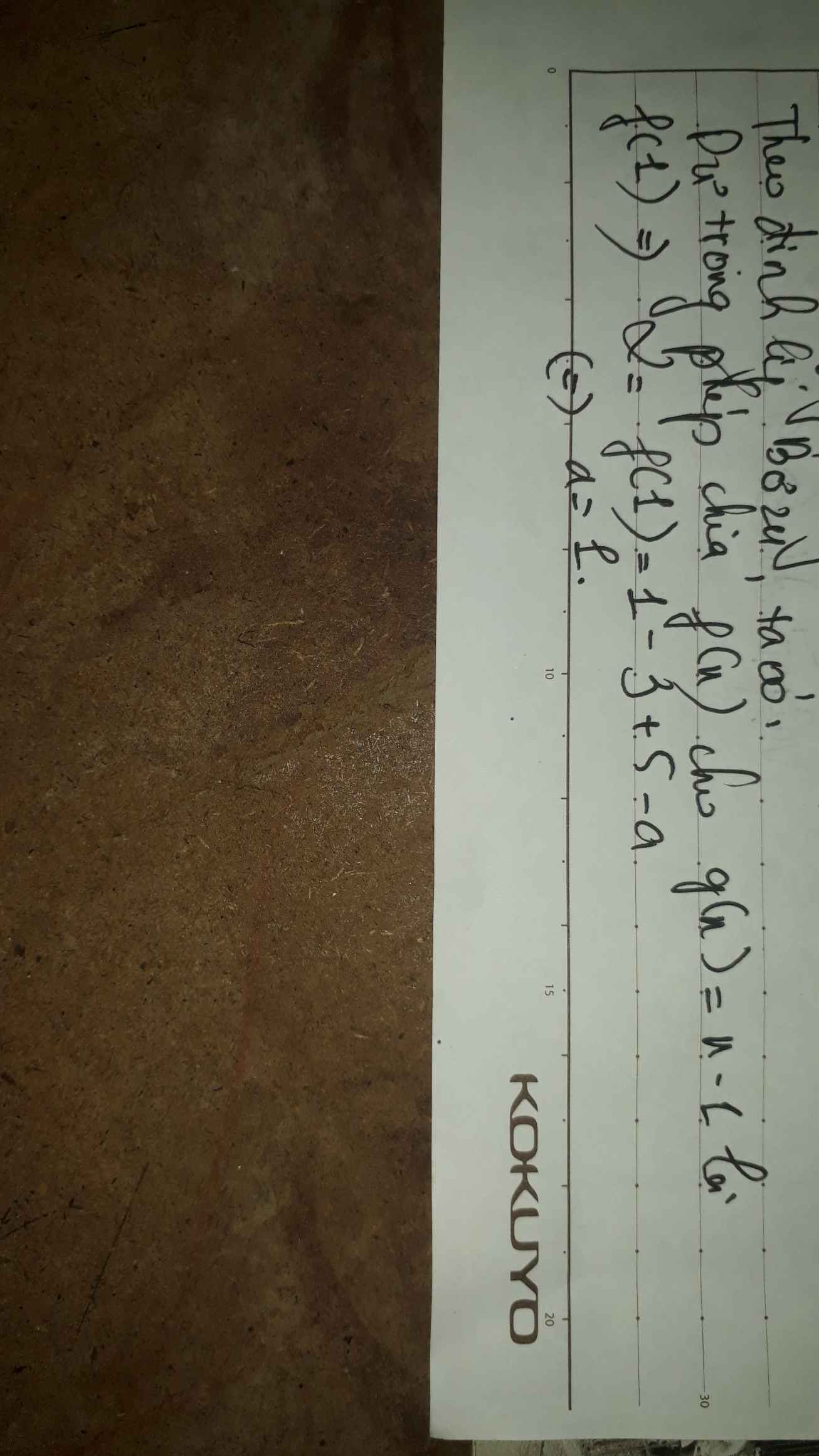Hãy nhập câu hỏi của bạn vào đây, nếu là tài khoản VIP, bạn sẽ được ưu tiên trả lời.

b: Ta có: f(x):g(x)
\(=\dfrac{x^3-2x^2+3x+a}{x+1}\)
\(=\dfrac{x^3+x^2-3x^2-3x+6x+6+a-6}{x+1}\)
\(=x^2-3x+6+\dfrac{a-6}{x+1}\)
Để f(x):g(x) là phép chia hết thì a-6=0
hay a=6

a: Thay a=3 vào f(x), ta được:
\(f\left(x\right)=x^3-2x^2+3x+3\)
\(\dfrac{f\left(x\right)}{g\left(x\right)}=\dfrac{x^3-2x^2+3x+3}{x+1}\)
\(=\dfrac{x^3+x^2-3x^2-3x+6x+6-3}{x+1}\)
\(=x^2-3x+6-\dfrac{3}{x+1}\)

a: Thay a=2 vào f(x), ta được:
f(x)=3x-2
f(x):g(x)
\(=\dfrac{3x-2}{x-1}\)
\(=\dfrac{3x-3+1}{x-1}\)
\(=3+\dfrac{1}{x-1}\)

\(a,f\left(x\right):g\left(x\right)=\left(3x^4+9x^3+7x+2\right):\left(x+3\right)\\ =\left[3x^3\left(x+3\right)+7\left(x+3\right)-19\right]:\left(x+3\right)\\ =\left[\left(3x^3+7\right)\left(x+3\right)-19\right]:\left(x+3\right)\\ =3x^3+7.dư.19\)
\(c,\) Để \(k\left(x\right)⋮g\left(x\right)\Leftrightarrow-x^3-5x+2m=\left(x+3\right)\cdot a\left(x\right)\)
Thay \(x=-3\)
\(\Leftrightarrow-\left(-3\right)^3-5\left(-3\right)+2m=0\\ \Leftrightarrow27+15+2m=0\\ \Leftrightarrow2m=-42\\ \Leftrightarrow m=-21\)

Lời giải:
a. $f(x)=x^4-3x^2+2x-7=x^3(x+2)-2x^2(x+2)+x(x+2)-7$
$=(x+2)(x^3-2x^2+x)-7=g(x)(x^3-2x^2+x)-7$
Vậy $f(x)$ chia $g(x)$ được thương là $x^3-2x^2+x$ và dư là $-7$
b. Theo phần a $f(x)=(x^3-2x^2+x)g(x)-7$
Với $x$ nguyên, để $f(x)\vdots g(x)$ thì $7\vdots g(x)$
$\Leftrightarrow x+2$ là ước của $7$
$\Rightarrow x+2\in\left\{\pm 1;\pm 7\right\}$
$\Leftrightarrow x\in\left\{-3; -1; 5; -9\right\}$
c.
Theo định lý Bezout về phép chia đa thức, để $K(x)=-2x^3+x-m\vdots x+2$ thì: $K(-2)=0$
$\Leftrightarrow -2(-2)^3+(-2)-m=0$
$\Leftrightarrow 14-m=0$
$\Leftrightarrow m=14$

`f(x):g(x)` dư 2
`=>f(x)-2\vdots g(x)`
`=>x-3x+5x-a-2\vdots x-1`
`=>3x-3+a+1\vdots x-1`
`=>3(x-1)+a+1\vdots x-1`
`=>a+1=0=>a=-1`
a: Ta có: f(x):g(x)
\(=\dfrac{3x-a}{x-1}\)
\(=\dfrac{3x-3+3-a}{x-1}\)
\(=3+\dfrac{3-a}{x-1}\)
Để f(x):g(x) có số dư là 2 thì 3-a=2
hay a=1

Thực hiện phép chia đa thức \(f\left(x\right)\) cho \(g\left(x\right)\) ta được
\(x^4-9x^3+21x^2+x+a=\left(x^2-x-2\right)\left(x^2-8x+15\right)+a+30\)
Do đó dư của phép chia \(f\left(x\right)\) cho \(g\left(x\right)\) là \(a+30\).
a) Với \(a=-100\) dư của phép chia đa thức \(f\left(x\right)\) và \(g\left(x\right)\) là \(-100+30=-70\).
b) Để \(f\left(x\right)\) chia hết cho \(g\left(x\right)\) thì \(a+30=0\Leftrightarrow a=-30\).

d: Ta có: f(x):g(x)
\(=\dfrac{x^3-2x^2+3x+5}{x+1}\)
\(=\dfrac{x^3+x^2-3x^2-3x+6x+6-1}{x+1}\)
\(=x^2-3x+6+\dfrac{-1}{x+1}\)
Để f(x) chia hết cho g(x) thì \(x+1\in\left\{1;-1\right\}\)
hay \(x\in\left\{0;-2\right\}\)